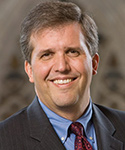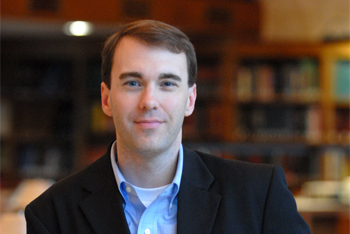
What's the future of denominations?
 Link to author L. Gregory Jones
Link to author L. Gregory Jones
L. Gregory Jones begins the conversation by exploring denominations’ purpose and function, economic models and role in educating lay and ordained ministers.
A major figure in the emerging church talks about what’s good about denominations, the challenges the organizations face and some “wild ideas” for the future.

But if denominations are to have a vibrant future, they must become a means to network people in meaningful, covenantal relationships, says the former head of the Reformed Church in America.

Church leaders must be willing to hold themselves accountable for what’s going on in congregations because wishful thinking won’t help the church thrive in the future, the late AME bishop said in a 2010 interview.
There will be a “leveling out” in the future as the emphasis shifts from clergy, buildings and the white middle class to a more empowered lay leadership, a variety of venues and a more expansive view of “who God has called to be God’s people,” says the stated clerk of the PC(USA).
Local congregations are finding ways to thrive by developing liturgical and ministry-based niches in their communities while anchoring their identities in denominations, says the former dean of the Wake Forest School of Divinity.

Denominations are needed to harness the power of individuals and congregations to take action against global warming, says the UCC’s Massachusetts conference minister.
The senior pastor of Ray of Hope Christian Church says the future and power of the Disciples of Christ lies in the local congregation, in the people who move out in ministry and witness as the whole church.
United Church of Christ’s national leadership seeks to enact change while staying true to the denomination’s core values of radical hospitality, inclusiveness and social justice.
Denominations will always exist, says UMC Bishop Gregory Palmer, because they provide cohesiveness and capacity -- the ability to bring resources together and leverage them to do enormous good.
Asking, “What can we learn from other denominations?” Geoff Moore applies receptive ecumenism to the practice of building healthy churches.
All people crave the truth, says AME Bishop Jeffrey Leath. And one of the key roles for denominations is to be a reliable source of that truth, an arbiter of its trustworthy presentation.
Maintaining and strengthening denominations’ prophetic voice is critically important, says the leader of Church World Service.
The executive director of Global Mission for the ELCA says denominations are a source of identity, the lenses through which everything is viewed: Scripture, church and society.
Denominations are distinctive traditions within one Body of Christ, and terms like “Methodist” and “Presbyterian” are adjectives that qualify the word “Christian,” says the former general secretary of the National Council of Churches.
In the future, denominational missions will be understood as work shared with partners around the world, says the executive minister of the United Church of Christ's Wider Church Ministries.

Affirmation of inclusion in the body of Christ is the purest expression of denominations, but too often they encourage exclusion, says the former international executive director of Word Made Flesh.
Christian leaders -- Orthodox and others -- are challenged to translate love into a day-to-day life in which people are isolated, says the assistant chancellor of the Greek Orthodox Archdiocese of America.
Get rid of real estate, focus on education and trim, trim, trim. That’s the advice to denominational leaders from the author of “The Great Emergence.”
Church consultant Gil Rendle wonders: What would it be like if the church lived out of a culture of sufficiency rather than one of scarcity?
More on Christian Leadership
Martin Luther King Jr. is a hero who was also human
The people we admire must reflect a faithful commitment to ongoing spiritual formation despite their flaws. That is more important than perfection, a Methodist pastor writes.
 Link to author Justin Coleman
Link to author Justin Coleman
Who supports you in times of crisis?
Families and congregations can help sustain us through life’s difficulties, but institutions also play a crucial role, writes the executive director of Leadership Education at Duke Divinity.
 Link to author David L. Odom
Link to author David L. Odom
My New Year’s resolution? Take more risks
In a world that is volatile, uncertain, chaotic and ambiguous, it’s important to keep learning. But that means taking risks.
 Link to author Chris Aho
Link to author Chris Aho
More on Congregations
‘Becoming a Future-Ready Church: 8 Shifts to Encourage and Empower the Next Generation of Leaders’
A missiologist, a religion journalist and a church researcher write about one of the largest American churches in the 1960s in an excerpt from a recent book.
When the power goes out, churches offer shelter through the Community Lighthouse network
New Orleans churches and community centers are being outfitted with backup and solar power to create a microgrid for residents during the city’s frequent outages. But that’s not the only value they offer.
 Link to author Delaney Dryfoos
Link to author Delaney Dryfoos
Religious AI: Seven principles to consider when using GPTs
After studying religious GPTs, a scholar of technology and faith offers guidelines to help pastors who use these tools.
 Link to author Heidi A. Campbell
Link to author Heidi A. Campbell









